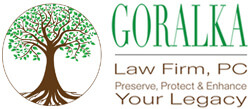“If the surviving spouse attempts to use the deceased spouse’s one-half of the community property, it may trigger a variety of undesirable outcomes,” explains John Goralka in an article published in Private Wealth Magazine. “An existing B trust can be a ticking time bomb, detonating after the death of the surviving spouse.”
B trusts can create significant issues, including higher taxes during the surviving spouse’s life and higher capital gains taxes when assets are sold, without saving any estate tax. These types of trusts are typically irrevocable, but they can be modified during the surviving spouse’s life. Mr. Goralka advises that families with B trusts have two options. The best alternative is to obtain a court order to modify the trust. Another possibility to consider is to “decant” the trust by moving assets to create new, more desirable provisions. With either option, it’s essential that families move quickly to avoid substantially higher taxes.
